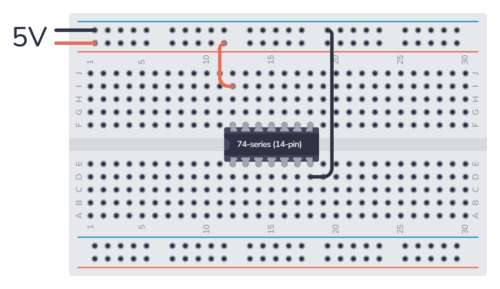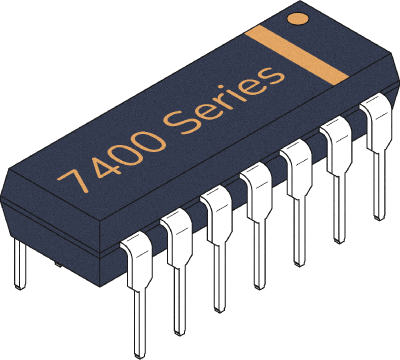This IC, often found as 74LS02 or 74HC02, is a chip with four basic NOR gates. The NOR gate is a logic gate – one of the most basic building blocks in digital electronics. The chip comes in a 14-pin package with the following pinout:
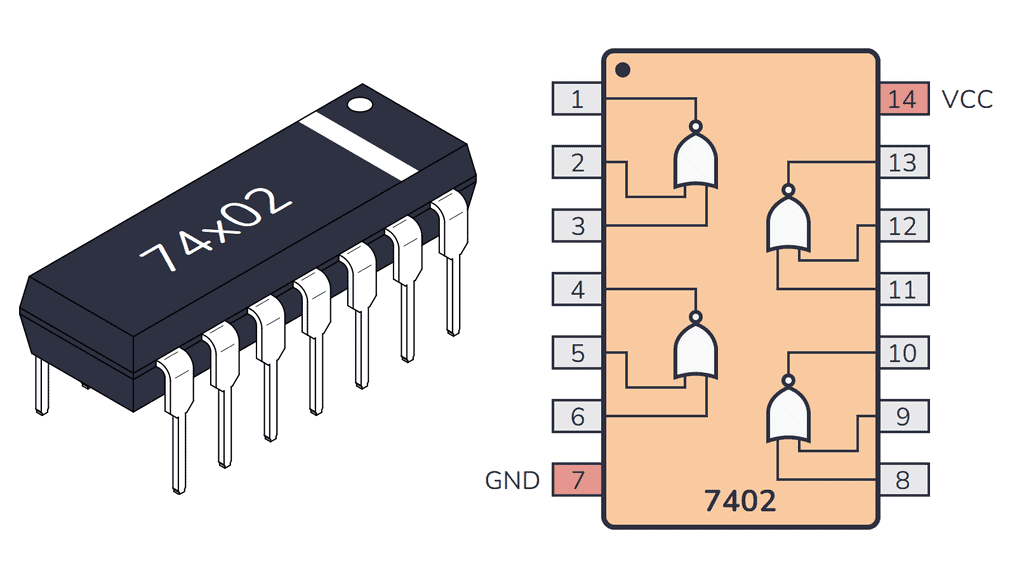
In this guide, you’re going to learn what the 74×02 IC does and how to hook it up in a circuit.
What does the 74LS02 / 74LS02 do?
The 74×02 gives you four basic NOR gates that can be used individually. A NOR gate is a logic gate that outputs 1 (HIGH) if all of its inputs are 0 (LOW). In the truth table below, you can see what the output will be for any given input:
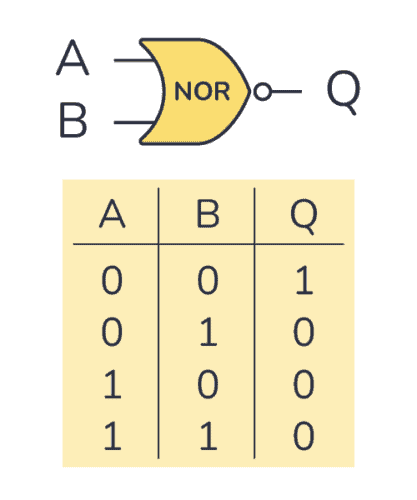
How To Use This Chip
Like every other chip in the 7400 series, this IC needs to be connected to power before you can use it. Most 7400 ICs support a VCC voltage of 5V. One difference between the HC and LS version of the chip is that the 74HC02 supports 2V to 6V, while the 74LS02 supports only 5V.
Once it’s connected, you can use any of the four basic NOR gates inside.
The amount of current you can pull out of each output depends on which chip you are using.
74HC02:
Each NOR gate output of the 74HC08 can sink or source 4 mA when powered with 5V.
74LS02:
HIGH-Level Output Current: 0.4 mA
LOW-Level Output Current: 8 mA
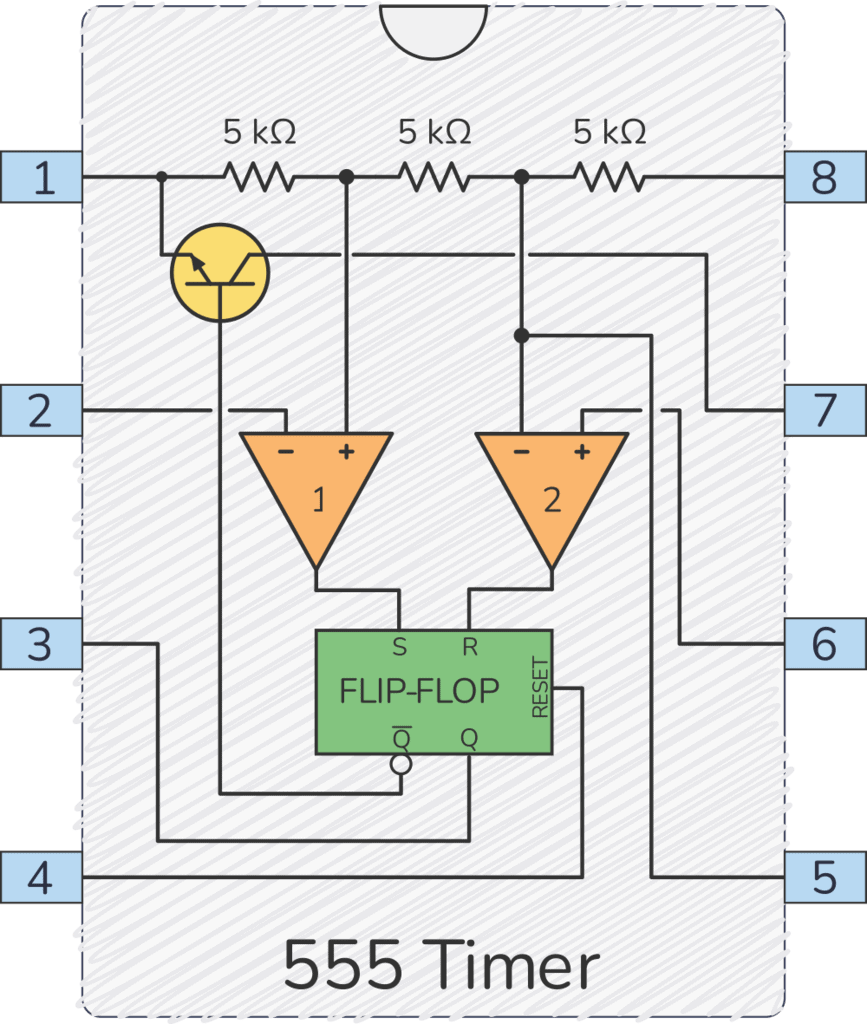
Get the 555 Timer Cheatsheet
A super helpful reference that makes it easy to design circuits, so that you can build oscillators, timer circuits, and more in no time.
74×02 Pinout
The 74×02 has 14 pins and contains four basic NOR gates laid out as shown in the pinout diagram below:
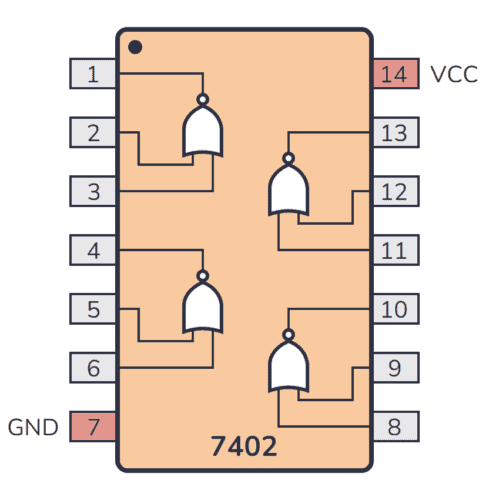
| Pin Name | Pin # | Type | Description |
|---|---|---|---|
| 1Y | 1 | Output | Output from the first NOR gate. |
| 1A | 2 | Input | Input to the first NOR gate. |
| 1B | 3 | Input | Input to the first NOR gate. |
| 2Y | 4 | Output | Output from the second NOR gate. |
| 2A | 5 | Input | Input to the second NOR gate. |
| 2B | 6 | Input | Input to the second NOR gate. |
| GND | 7 | Power | Connect to ground. |
| 3A | 8 | Input | Input to the third NOR gate. |
| 3B | 9 | Input | Input to the third NOR gate. |
| 3Y | 10 | Output | Output from the third NOR gate. |
| 4A | 11 | Input | Input to the fourth NOR gate. |
| 4B | 12 | Input | Input to the fourth NOR gate. |
| 4Y | 13 | Output | Output from the fourth NOR gate. |
| VCC | 14 | Power | Positive power supply. Connect to +5V power. |
74×02 Circuit Example
Here’s a simple project you can build with the 74×02 IC. The NOR gates make up an SR latch that remembers the last output value it had. It controls an LED that you can turn on by pressing the On button. It will stay on even after you release the button. To turn the LED off, press the Off button.
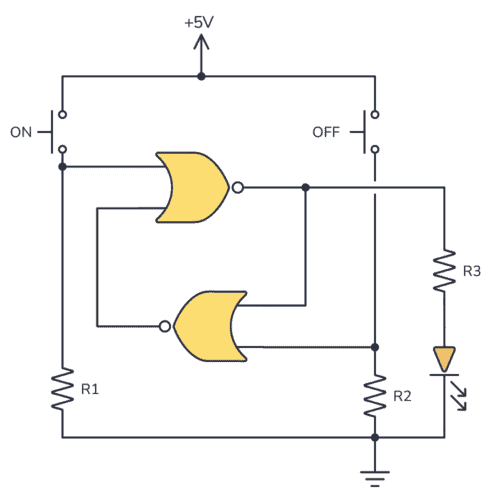
To build this circuit, you’ll need the following parts:
- 1 x 74×02 (such as 74LS02 or 74HC02)
- 1 x LED (L1)
- 2 x 10 kΩ resistor (R1-R2)
- 1 x 1 kΩ resistor (R3)
- 2 x pushbutton (S1-S2)
Alternatives and Equivalents for 74HC02 / 74LS02
There are many versions of the 74×02 chip. They all have the same functionality, but with different specifications such as supported voltages and maximum current output.
Here’s a list of a few equivalents of this chip:
- 74HC02 (High-speed CMOS)
- 74HCT02 (High-speed CMOS, TTL compatible)
- 74LS02 (High-speed TTL)
- 74LVC02 (Low Voltage TTL)
- 74AC02 (Advanced CMOS)
- 74ALS02 (Advanced Low-Power Schottky TTL)
- 74F02 (Very High Speed)
- 74C02 (CMOS, similar to the 4000-series)
Some manufacturers also add a prefix, such as the SN74HC02 and SN74LS02 by Texas Instruments.
Can’t find the 74×02 anywhere? Then try one of the following IC alternatives:
- 74×33 – Quad 2-input NOR gates (with open-collector outputs).
- 74×7032 – Quad 2-input NOR gates (with Schmitt-trigger inputs).
- CD4001 – Quad 2-input NOR gates.
If you can’t find the 74×02 IC in your local electronics store, don’t worry, you’ll most likely find it in one of the stores listed on this page of online stores where you’ll find components and tools for all your electronics projects.
Datasheet for the 74LS02 and 74HC02 chips
Download the PDF datasheet for your version of the 74×02 here:
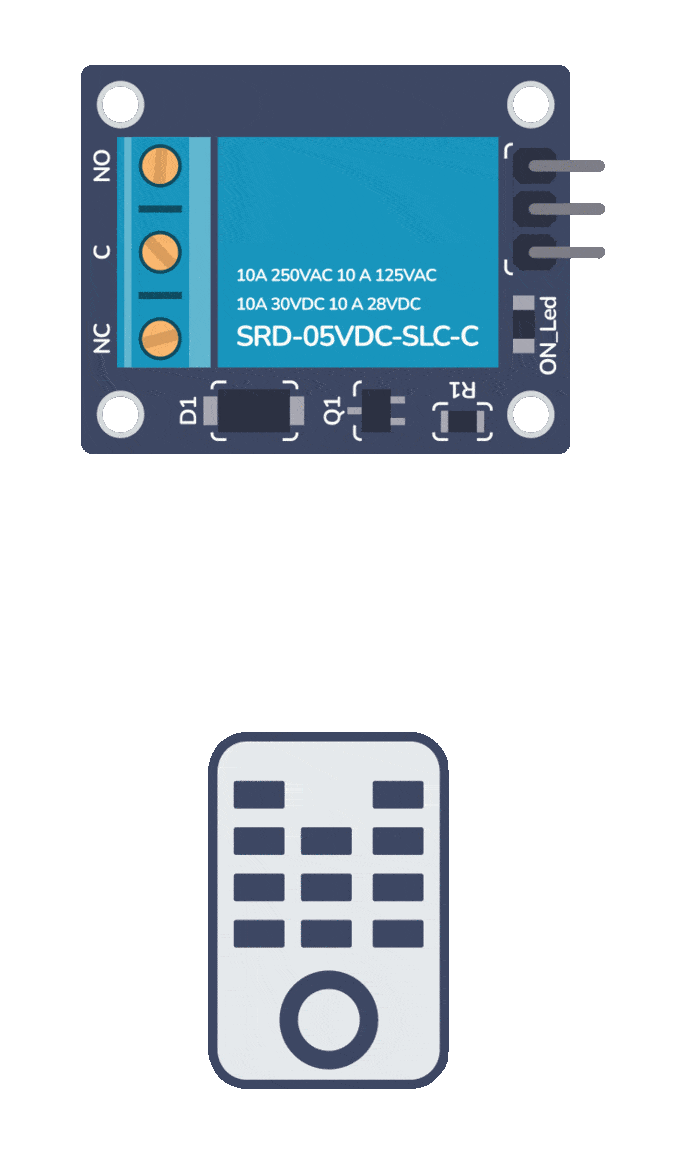
Build Something Useful This Evening
This gadget lets you use any IR remote-control to control your lamp, garden lights, heater oven, garage door, or anything else.

